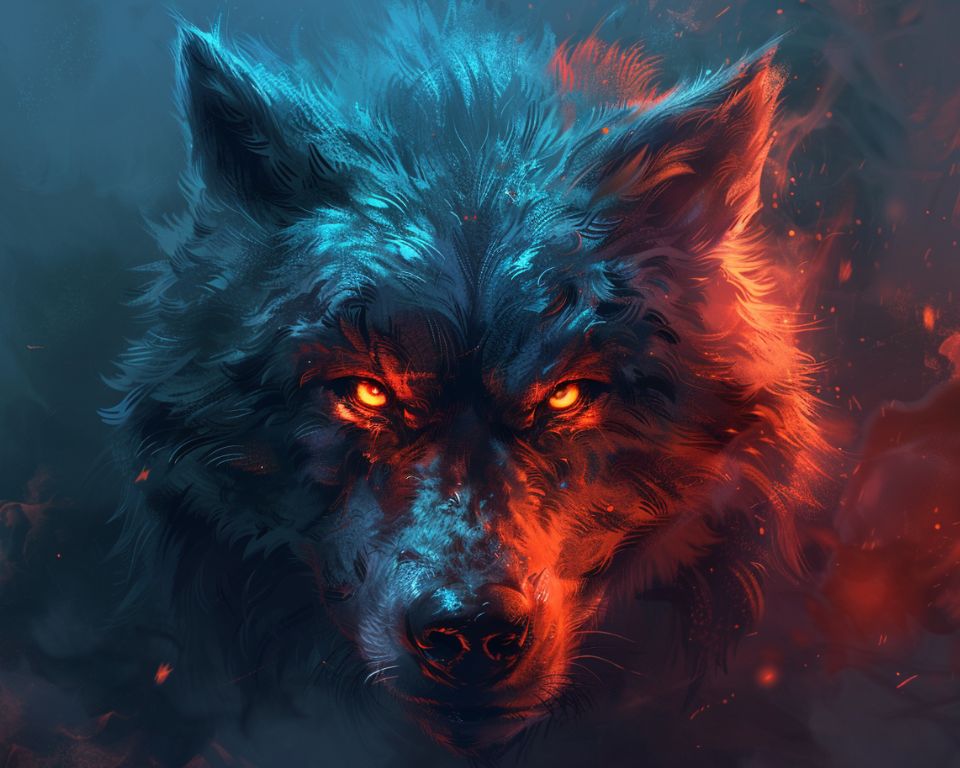In our lives, we often look for meanings that explain the unknown or connect us deeply to the mysteries surrounding us.
This time, we’re diving into a fascinating aspect of mythology and spirituality – the werewolf.
Most of us know werewolves from scary movies or Halloween stories, but have you ever wondered if there’s more to these mythical creatures than meets the eye?
Beyond the howls and the full moon transformations, werewolves carry a rich spiritual symbolism that speaks volumes about human nature, personal growth, and the struggle between our wild instincts and societal expectations.
In this article, we’ll explore the origins of werewolf myths, their cultural variations, and the deep spiritual meanings they hold.
We’ll also discuss how werewolves can serve as guides or totems in our personal transformation journeys, helping us embrace our true selves and the dualities within.
So, if you’re curious about how these legendary beings can offer insights into your personal and spiritual growth, stick around as we uncover the spiritual meaning of werewolves.
Key Takeaways
- Werewolves in Mythology: Werewolves are not just scary creatures from horror stories; they have deep roots in folklore and mythology, representing various cultural views on transformation and the human condition.
- Spiritual Symbolism: Beyond the surface, werewolves symbolize the dual nature of humanity, including the constant battle between our rational selves and our wilder, instinctual urges, as well as the concept of the shadow self.
- Personal Growth and Transformation: The werewolf’s transformation can be seen as a metaphor for personal growth and the journey of navigating one’s inner changes and challenges.
- Guide or Totem: For some, the werewolf can act as a spiritual guide or totem, offering lessons on embracing one’s full self, including the parts we might prefer to hide or deny.
- Inner Work and Discovery: Werewolf symbolism encourages reflection and inner work, urging us to embrace every aspect of ourselves, including our strengths and vulnerabilities, to achieve personal harmony and growth.
The Werewolf in Mythology and Folklore
When we think of werewolves, our minds might jump straight to horror movies where these creatures are seen as fearsome beasts.
However, the story of the werewolf goes way back and is richer and more varied than most of us know.
The concept of humans transforming into wolves can be found in stories and legends from many different cultures across the world. From ancient Greek myths to Native American stories, the idea of werewolves has fascinated people for centuries.
In ancient Greek mythology, for instance, the story of Lycaon, a king who was turned into a wolf by Zeus, is one of the earliest examples of werewolf tales.
This transformation was a punishment for his lack of respect towards the gods, showing early connections between werewolves and the theme of moral and ethical lessons.
In European folklore, werewolves were often seen as cursed individuals who transformed into wolves at night, a belief that led to numerous tales and even witch hunts in the Middle Ages.
These stories varied greatly, with some seeing the werewolf as a protective force against evil while others viewed them as malevolent beings.
Different cultures interpret the werewolf in various ways, but common themes of transformation, the blending of human and animal characteristics, and the struggle between good and evil run through most werewolf legends.
These rich and diverse stories help us understand the complex symbolism of werewolves beyond the scary creatures of modern pop culture.
Spiritual Symbolism of Werewolves
The spiritual meaning of werewolves extends far beyond their fearsome exterior depicted in popular culture.
These mythical creatures symbolize a powerful message about the dual nature of humanity—the coexistence of our rational, controlled self and our wilder, instinctual urges.
This duality reflects the inner struggle many of us face in reconciling our societal obligations with our natural desires.
At the heart of werewolf symbolism is the concept of transformation and personal growth.
Just as werewolves transform from human to wolf, this shift can represent our own journey of change—embracing new phases of life, overcoming personal challenges, and growing from our experiences.
It illustrates that change, although often difficult and unpredictable, is a natural and necessary part of life.
Furthermore, werewolves bring to light the idea of the shadow self, a term coined by psychologist Carl Jung.
This aspect of ourselves encompasses the parts we might prefer to hide or deny—our fears, hidden desires, and unconscious impulses.
Werewolves, with their ability to shift between human and beast, encourage us to confront and integrate our shadow self into our conscious life.
By acknowledging and accepting these darker parts, we can achieve a more complete and balanced understanding of our true nature.
In this light, werewolves offer a rich tapestry of spiritual meanings that invite us to explore the depths of our own identity, encouraging us to reflect on our personal growth and the integration of our many selves.
The Werewolf as a Guide or Totem
In many spiritual traditions, animals serve as guides or totems, each offering unique insights and teachings about life.
The werewolf, though more myth than reality, can also fulfill this role. As a spiritual guide, the werewolf teaches us about the power of transformation and the importance of embracing change, even when it’s challenging.
Just as the werewolf transitions from human to wolf, we too undergo numerous transformations throughout our lives. These changes, whether they’re related to our personal, professional, or spiritual growth, require us to adapt and evolve.
The werewolf guide also invites us to explore and understand our dual nature. It reminds us that we all have a wild, instinctual side alongside our more civilized self.
This isn’t something to be feared or suppressed but rather acknowledged and embraced.
By doing so, we can find a balance between the two, using our instincts to guide us while still respecting the rules and norms that allow us to live harmoniously in society.
Furthermore, the werewolf as a guide encourages us to confront our shadow self. This includes our fears, desires, and the aspects of ourselves that we might not be proud of. Instead of hiding these away, the werewolf urges us to bring them into the light.
This process of self-exploration and acceptance can lead to profound personal growth, healing, and a deeper connection with our true selves.
Thus, the werewolf isn’t just a creature of horror stories but a powerful symbol for those on a spiritual journey.
It represents the messy, beautiful process of becoming who we are meant to be, offering guidance and wisdom every step of the way.
Applying Werewolf Spiritual Meanings to Personal Growth
The spiritual symbolism of werewolves offers valuable lessons for our journey of personal growth.
By reflecting on the transformative power and dual nature these creatures represent, we can gain insights into our own lives and the paths we are on.
Here’s how we can apply these meanings to foster our development and embrace our true selves more fully.
First, recognizing the transformational aspect of werewolves encourages us to embrace change as an opportunity for growth.
Life is full of transitions, and like the werewolf, we may find ourselves in periods of profound change that can feel both frightening and exhilarating.
These moments are invitations to shed old ways and step into new versions of ourselves, brimming with potential and growth.
Embracing our dual nature is another lesson from werewolf symbolism. Acknowledging that we possess both light and dark aspects within us allows for a more authentic and holistic self-understanding.
It’s important to honor our rational minds and our instinctual sides, finding balance and harmony between them.
This balance helps us navigate our desires, fears, and social interactions more wisely and compassionately.
Engaging in reflection and inner work is crucial for integrating the shadow self—the parts of us we might rather keep hidden.
Werewolf symbolism teaches us the value of confronting these shadows, not with judgment, but with curiosity and acceptance. By understanding our deeper motivations and fears, we foster self-compassion and a sense of inner peace.
Lastly, the werewolf’s guide teaches us to be resilient in the face of life’s challenges.
Just as the werewolf endures its transformation, we too can find strength and courage within ourselves to face personal trials and emerge stronger.
In essence, werewolf spiritual meanings guide us towards embracing change, understanding our complexity, and engaging in deep self-exploration.
This path of reflection and acceptance leads to significant personal transformation, aligning us closer with our true selves.
Conclusion
In wrapping up, the spiritual meaning of werewolves takes us deep into the heart of our own nature, reminding us of the transformative power, dual aspects, and shadow sides of humanity.
Beyond the thrilling tales and moonlit transformations lies a profound symbolism that resonates with the challenges and journeys we face in our personal growth.
Werewolves, as mythical creatures, serve as a powerful metaphor for embracing change, understanding our darker parts, and striving for a harmonious balance between our civilized selves and our wild, instinctual natures.
They invite us to look inward, engage in reflection and self-discovery, and ultimately, emerge stronger, more integrated individuals.
By exploring the spiritual landscape that werewolves inhabit, we can uncover valuable insights into our own lives and the process of becoming our fullest selves.
Whether as guides, totems, or symbols of transformation, werewolves remind us of the richness of our inner worlds and the endless potential for growth and self-realization.
Frequently Asked Questions
1. Can werewolves be considered positive spiritual symbols?
Yes, werewolves can be considered positive spiritual symbols. Despite their often fearsome depiction in popular culture, werewolves symbolize transformation, the dual nature of humanity, and the acceptance of one’s shadow self. These aspects can be positively interpreted as encouraging personal growth, embracing change, and acknowledging all parts of oneself for holistic self-understanding and development.
2. How can I connect with the werewolf as a spiritual guide or totem?
Connecting with the werewolf as a spiritual guide or totem involves introspection and a willingness to explore the deeper aspects of your personality, including your instincts and any qualities or desires you might usually suppress. Journaling, meditation, and reflective practices that focus on transformation and self-acceptance can facilitate this connection. Also, studying werewolf mythology and folklore can provide insights and inspiration for understanding the werewolf’s role in your spiritual journey.
3. What does it mean if I dream about werewolves?
Dreaming about werewolves could reflect inner conflicts, hidden fears, or unacknowledged desires. Since werewolves symbolize transformation and the shadow self, such a dream might indicate a period of change or personal growth. It could also suggest that you are grappling with aspects of yourself that you find difficult to accept or express openly. Reflecting on the feelings and context of the dream can provide further insights into its meaning.
4. Are there other mythical creatures with similar spiritual meanings?
Yes, there are many other mythical creatures that carry similar spiritual meanings, focusing on transformation, duality, and personal growth. Some examples include the phoenix, known for its cycle of death and rebirth, symbolizing renewal and resilience; and the dragon, which often represents power, wisdom, and the ability to overcome challenges through strength and courage. Each creature offers unique insights into the human experience and our spiritual paths.


